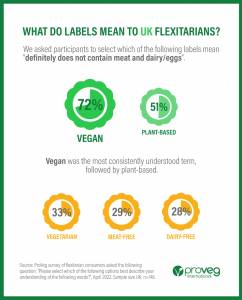The latest news, trends, analysis, interviews and podcasts from the global food and beverage industry
What do the terms ‘vegan’ and ‘plant-based’ have in common? Well, according to consumers, they’re not entirely sure.
With a third of people choosing to actively reduce their meat and dairy consumption and seeking protein substitutes driven by health and environmental concerns, the food industry is beginning to think carefully about the potential of the plant-based sector. Given the huge scope of possibilities for the industry, how best to label plant-based food products has become a source of major debate.
Labelling plant-based products
While the correct terminology is key to successfully targeting flexitarians, there still seems to be some uncertainty around the definition of ‘plant-based’ amongst consumers.
The term ‘vegan’ is well-understood by flexitarians in English-speaking countries, as shown by a survey carried out by ProVeg International, which found that 72% of UK respondents and 64% of US respondents understand that a vegan product “definitely does not contain animal meat, eggs, or dairy”.
By comparison, only 51% of UK flexitarians and 54% of US flexitarians believe the same applies to products labelled as ‘plant-based’.
The fact that there is no formal legal definition in the UK or the US regarding vegan or plant-based products is perhaps an underlying cause of consumer confusion since the two terms tend to be used interchangeably.
So, if ‘vegan’ is better understood than ‘plant-based’, why not use this language across all products? Well, research by the Good Food Institute found that variations of the term ‘plant-based’ increased mainstream consumer purchasing intent by around 20%, compared to the term ‘vegan’.
In order to dig deeper into this topic, ProVeg International recently conducted further research, which looked at how eight different labelling variations affected consumers’ perceptions and the likelihood of choosing a plant-based product. The research explored how terms such as ‘vegan’, ‘vegetarian’, ‘veggie’, ‘plant-based’, ‘100% plant-based’, ‘meatless’, ‘meat-free’ and ‘animal-free’ influence a consumer’s decision to choose a plant-based-chicken nugget over its conventional counterpart.
Although the research showed there was no significant difference between different names in terms of the proportion of people choosing the plant-based option, the terms ‘vegan’, ‘meatless’ and ‘meat-free’ were perceived by consumers as slightly worse in terms of factors such as health, taste and sustainability, while ‘plant-based’ and ‘100% plant-based’ were perceived as slightly better.
Stephanie Jaczniakowska-McGirr, director of corporate engagement at ProVeg International, suggests that products get V-label certification. “It’s the most reliable way to give consumers who are seeking 100% animal-free products the confidence that they might lack, based on terminology alone. Opting for ‘100% plant-based’ on the front of pack, with a V-label certification on the back, is the best way to appeal to flexitarian consumers while still using language that is well understood by the general population.”
Consumer confusion around ‘meaty’ language
There has been much debate and proposed legislative changes in recent years around the use of ‘meaty’ language on plant-based products. For example, the South African Department of Agriculture, Land Reform and Rural Development has called for all references to ‘meaty’ terms to be removed from product packaging, while, in France, the French Decree prohibits manufacturers of plant-based products from using “sector-specific terminology traditionally associated with meat and fish”. Fortunately, both proposed changes have been suspended in recent weeks, but ProVeg International, along with the plant-based sector as a whole, is pushing for long-term solutions.
Consumer confusion is often referenced as a reason for such changes. But are consumers really confused by terms such as ‘plant-based nugget’? In a study conducted by ProVeg International, the answer is a resounding ‘no’!
Just 3.6% of survey respondents who chose the plant-based nuggets over the meat-based nuggets claimed to have done so by mistake, which strongly suggests that labelling such products as ‘nuggets’ did not generally confuse consumers.
“Our research clearly shows that our respondents understand the choices they make and are not confused by terms in relation to plant-based products. Consumers buy plant-based products precisely because they know that these products offer similar taste experiences and functionalities to their animal-based counterparts,” said Jaczniakowska-McGirr.
Next Steps
ProVeg will continue working with stakeholders in order to ensure that plant-based products are not removed from supermarket shelves and to urge authorities to focus on developing appropriate regulations that do not penalise the plant-based sector.
If you’d like access to all of our resources for harnessing the power of plant-based, including the full report on how best to label plant-based products, head over to the New Food Hub now.
#ProVegInternational



